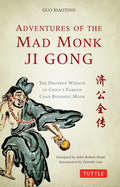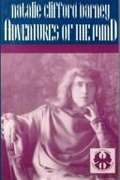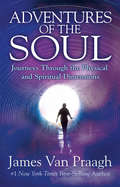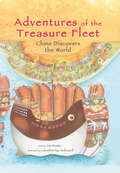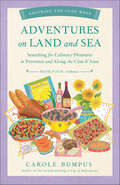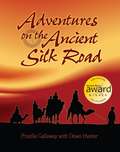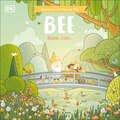- Table View
- List View
Adventures of the Mad Monk Ji Gong
by Victoria Cass Guo Xiaoting John Robert ShawFollow the brilliant and hilarious adventures of a mad Zen Buddhist monk who rose from humble beginnings to become one of China's greatest folk heroes!Ji Gong studied at the great Ling Yin monastery, an immense temple that still ranges up the steep hills above Hangzhou, near Shanghai. The Chan (Zen) Buddhist masters of the temple tried to instruct Ji Gong in the spartan practices of their sect, but the young monk, following in the footsteps of other great ne'er-do-wells, distinguished himself mainly by getting expelled. He left the monastery, became a wanderer with hardly a proper piece of clothing to wear, and achieved great renown-in seedy wine shops and drinking establishments!This could have been where Ji Gong's story ended. But his unorthodox style of Buddhism soon made him a hero for popular storytellers of the Song dynasty era. Audiences delighted in tales where the mad old monk ignored-or even mocked-authority, defied common sense, never neglected the wine, yet still managed to save the day. Ji Gong remains popular in China even today, where he regularly appears as the wise old drunken fool in movies and TV shows. In Adventures of the Mad Monk Ji Gong, you'll read how he has a rogue's knack for exposing the corrupt and criminal while still pursuing the twin delights of enlightenment and intoxication. This literary classic of a traveling martial arts master, fighting evil and righting wrongs, will entertain Western readers of all ages!
Adventures of the Mind from the Saturday Evening Post
by Richard Thruelsen John KoblerTo discover and remember. It is a vast assignment, and it has been met here face to face. That is why any serious reader of this volume--one, I mean, who is not desperate for easy answers, but rather is willing to consider with some of the finest spirits of his age the toughest problem man is ever called upon to tackle --will be content with what he finds. "What is Man?" The question is immemorial, and no clear answer has ever been given. But the best men are those who, knowing this, still listen for the truth. It is as old as Creation, and as new as the infant who first saw light this morning.
Adventures of the Mind: The Memoirs of Natalie Clifford Barney
by Natalie C. Barney John S. GattonBarney explores her family tree, chronicles her friendships and associations through reprinted correspondence and recreated conversations, and evokes the golden age of her salon in gallery of literary portraits.
Adventures of the Mind: The Memoirs of Natalie Clifford Barney (The Cutting Edge: Lesbian Life and Literature Series #7)
by Natalie Clifford BarneyIn this book, Barney explores her family tree, chronicles her friendships and associations through reprinted correspondence and recreated conversations, and evokes the golden age of her salon in gallery of literary portraits.
Adventures of the Open Doors: Secrets Revealed
by Lynn Reed[Back Cover and Bookmark:] "Shannon's AMAZING JOURNEY, in this book is of a young archeology student's adventure; that changes her life forever. As her class travels to dig sites, a series of mysterious events open hidden secrets of prophetic revelations, from ancient times to the present. Many archeological discoveries foretell the true existence of the people in the land of Israel that will teach young adults that God truly does exist! Empowered by her adventurous spirit, Shannon comes to unlocking secret doors that define the truth and future events which she has been researching." Even though the story and characters are fictitious, the author uses the fiction to reveal many Biblical doctrinal truths and authentic archeological facts. The author sites scriptural references to substantiate the Biblical insights that she expounds. Though the author wrote this book for adolescent and young adult audiences, older readers can enjoy her discussion of the archeological findings and her concise elaboration of Judeo-Christian doctrinal, historical, and prophetic material.
Adventures of the Soul: Journeys Through the Physical and Spiritual Dimensions
by James Van PraaghAdventures of the Soul is a manual for anyone who has ever questioned where they come from, why they are here, and where they go after they die. Sharing his intuitive experiences of communicating with the Spirit World for the past 30 years, internationally renowned medium James Van Praagh takes you on a spiritual sojourn to discover the unique design of your very own soul and explore its various adventures as it travels between worlds. You&’ll learn to open up your mind to your soul&’s unbounded wisdom and gain a bigger perspective on life and a better grasp of your significant part in it.This book will further assist you in understanding and recognizing the soul lessons you came back to Earth to learn, such as sorrow, forgiveness, grief, compassion, and joy. By utilizing this knowledge, you will come to identify your soul&’s intricacies and start to live a life that truly fulfills your soul&’s destiny: following the path of love.This is one journey that will force you to look at life and death in a completely different light!
Adventures of the Superkids, Reader
by Pleasant T. Rowland Loretta Lustig Meryl Henderson Doug RoySuperkids have been helping students enjoy reading for years. This reader provides students opportunities to practice core skills.
Adventures of the Superkids, Student Book, Units 1-2
by Pleasant T. Rowland Loretta Lustig Meryl Henderson Doug RoyNIMAC-sourced textbook
Adventures of the Superkids: Word Work Book, Units 1–8 (Adventures of the Superkids)
by Pleasant T. RowlandNIMAC-sourced textbook
Adventures of the Symbolic: Post-Marxism and Radical Democracy (Columbia Studies in Political Thought / Political History)
by Warren BreckmanMarxism's collapse in the twentieth century profoundly altered the style and substance of Western European radical thought. To build a more robust form of democratic theory and action, prominent theorists moved to reject revolution, abandon class for more fragmented models of social action, and elevate the political over the social. Acknowledging the constructedness of society and politics, they chose the "symbolic" as a concept powerful enough to reinvent leftist thought outside a Marxist framework. Following Maurice Merleau-Ponty's Adventures of the Dialectic, which reassessed philosophical Marxism at mid century, Warren Breckman critically revisits these thrilling experiments in the aftermath of Marxism.The post-Marxist idea of the symbolic is dynamic and complex, uncannily echoing the early German Romantics, who first advanced a modern conception of symbolism and the symbolic. Hegel and Marx denounced the Romantics for their otherworldly and nebulous posture, yet post-Marxist thinkers appreciated the rich potential of the ambiguities and paradoxes the Romantics first recognized. Mapping different ideas of the symbolic among contemporary thinkers, Breckman traces a fascinating reflection of Romantic themes and resonances, and he explores in depth the effort to reconcile a radical and democratic political agenda with a politics that does not privilege materialist understandings of the social. Engaging with the work of Claude Lévi-Strauss, Cornelius Castoriadis, Claude Lefort, Marcel Gauchet, Ernesto Laclau, Chantal Mouffe, and Slavoj i ek, Breckman uniquely situates these important theorists within two hundred years of European thought and extends their profound relevance to today's political activism.
Adventures of the Treasure Fleet
by Ann Martin Bowler L. K. Tay-AudouardDid you know that 85 years before Columbus discovered America, Chinese ships longer than a football field sailed thousands of miles through unknown oceans and visited more than 30 nations? It's true! Adventures of the Treasure Fleet is the amazing story of these seven epic voyages and their larger-than-life commander, Admiral Zheng He.Beginning in 1405, Admiral Zheng He led more than 300 gigantic, brightly-painted ships across the South China Sea to the Indian Ocean and all the way to the distant coast of Africa. The admiral and his crew battled pirates and raging storms, and were amazed by the people and ways of life in distant lands. At each port, Chinese goods were traded for pearls, precious stones, herbs and medicines which were given as tribute to China's powerful emperor when the ships' returned home.Filled with historical facts, Adventures of the Treasure Fleet brings a fantastic piece of history to life. Gracefully told and beautifully illustrated, the story's fast pace will keep young ones captivated while offering enough information to satisfy curious readers of all ages.
Adventures of the Treasure Fleet
by Ann Martin Bowler L. K. Tay-AudouardDid you know that 85 years before Columbus discovered America, Chinese ships longer than a football field sailed thousands of miles through unknown oceans and visited more than 30 nations? It's true! Adventures of the Treasure Fleet is the amazing story of these seven epic voyages and their larger-than-life commander, Admiral Zheng He.Beginning in 1405, Admiral Zheng He led more than 300 gigantic, brightly-painted ships across the South China Sea to the Indian Ocean and all the way to the distant coast of Africa. The admiral and his crew battled pirates and raging storms, and were amazed by the people and ways of life in distant lands. At each port, Chinese goods were traded for pearls, precious stones, herbs and medicines which were given as tribute to China's powerful emperor when the ships' returned home.Filled with historical facts, Adventures of the Treasure Fleet brings a fantastic piece of history to life. Gracefully told and beautifully illustrated, the story's fast pace will keep young ones captivated while offering enough information to satisfy curious readers of all ages.
Adventures on Land and Sea: Searching for Culinary Pleasures in Provence and Along the Côte d'Azur (Savoring the Olde Ways Series)
by Carole BumpusFans of Peter Mayle and Janine Marsh will enjoy this exploration of medieval villages, cultures, and recipes of France’s Provence. This travelogue is Book 4 in the author’s best-selling series, which has won the IPPY gold medal for Best Culinary Travel Series.Join Carole Bumpus, her husband, Winston, and their friends in Book Four of Savoring the Olde Ways, her culinary-travel series. Following in the footsteps of writer Peter Mayle, Bumpus is on a quest to find the real Provençe. On three separate excursions—from Nice to Nîmes, Moustiers to Marseilles, and San Tropez to San Remy—and while sailing along the Côte d’Azur, she invites you to join her in uncovering the mysteries of Provençe. Are they hidden within their myths, festivals, or traditions? Is it possible they’re veiled in the sheer beauty of the land and sea? Could they be concealed in Roman arenas in Arles, Orange, or Glanum? Or, perhaps, within the ancient methods of traditional cooking or winemaking? Maybe they are hidden in plain sight among the locals who open their hearts, their bistros, and homes to strangers. Yes, you may find it in chefs while cooking in ancient kitchens, in the smile of the shy barmaid who speaks no English, in the giggle of the Pizza Wagon baby, in the agreeable village baker, or in the patient waiter and harbor master—but you will most especially experience it through friends who fling open their doors to share their families’ recipes. Traveling alongside Bumpus, that is where you’ll discover the real Provençe.
Adventures on a Summer’s Day: With Bandit & Company (Bandit And Company Ser. #Vol. 1)
by Pat Becker Margaret GaedderAdventures on a Summer’s Day is the first in a series about a variety of pets known as Bandit and Company. Readers will find the adventures of this troupe both entertaining and heartwarming. "WITH HER USUAL IMAGINATIVE FLAIR, Pat Becker brings to life this new series about a band of pet dogs and cats and their adventures in a loving home in an ideal setting. Readers of all ages will smile within when they recognize the human qualities the author has imbued in all these animals. And the interaction of these pets as they experience their various adventures will undoubtedly connect with discerning readers. The stunning color illustrations by artist Margaret Gaeddert add greatly to the character development and narrative. This is another winning collaboration between the author and the illustrator, both Oklahomans with a love of animals that reflects in their words and art. Readers can look forward to more entertaining and heartwarming stories about these animal characters, as this is the first of an illustrated series about the lives and adventures of the band of dogs and cats known as... Bandit and Company." Darl DeVault, Executive Editor Distinctly Oklahoma Magazine
Adventures on the Ancient Silk Road
by Priscilla Galloway Dawn HunterA gripping account of three dramatic journeys that changed history. The fabled Silk Road conjures up the sights, smells and sounds of faraway lands. But traveling the Silk Road took years, and those who set out encountered bandits, starvation and treacherous storms. Adventures on the Ancient Silk Road introduces readers to three great historical figures: Chinese Buddhist Xuanzang, whose 16-year journey from China to India and back (629-645 AD) is the only source we have for huge chunks of the history and geography of this time. His successful search for Buddhist scriptures changed the course of two great nations. Genghis Khan, bred from infancy to be a warrior, brought the Mongol clans together. He established the greatest empire the world had seen, which ruled the Silk Road from 1201 to 1227. Italian merchant Marco Polo journeyed through China from 1271 to 1295. He changed the way Europe saw the world, and his book even inspired Columbus to sail west across the Atlantic Ocean in search of China. Sidebars and an afterword that updates the story of the Silk Road are featured.
Adventures on the High Teas: In Search of Middle England
by Stuart MaconieEveryone talks about 'Middle England'. Sometimes they mean something bad, like a lynch mob of Daily Mail readers, and sometimes they mean something good, like a pint of ale in a sleepy Cotswold village in summer twilight. But just where and what is Middle England? Stuart Maconie didn't know either, so he packed his Thermos and sandwiches and set off to find out...Is Middle England about tradition and decency or closed minds and bigotry? Is it maypoles and evensong, or flooded market towns and binge drinkers in the park? And is Slough really as bad as Ricky Gervais and John Betjeman make out? From Shakespeare to JK Rowling, Vaughan Williams to Craig David, William Morris to B&Q, Stuart Maconie leads the expedition, with plenty of stop-offs for tea and scones, to discover the truth.
Adventures with Ari: A Puppy, a Leash & Our Year Outdoors
by Kathryn MilesMerle's Door was a sensation because Ted Kerasote writes so beautifully about his dog and his dog's love of the land. In Adventures wtih Ari, Kathryn Miles takes a step back from the wild places Kerasote describes. When she adopts Ari, an exotic Jindo dog, the two of them begin to explore the outdoors together. A dog sees the world quite differently from a person. For starters, he or she is much closer to the ground-to what we've been trying to preserve more and more of these days. A dog is the original environmental activist: The sights, sounds, and smells of nature are what make a dog a dog. And if you want to learn more about nature, try enjoying life like a dog. Kathryn Miles sets out to do just that when she becomes determined to let Ari live life on her own terms. Once some basic ground rules are set, Kathryn takes the leash off her dog and the blinders off her own eyes. A new world soon emerges: She and Ari explore a backyard landscape of grass, mud, snow, trees, and the occasional fox. They find the scent of a northern wind, the footprints of a startled raccoon, and other secrets of the natural world. The puppy's free-spirited outlook teaches Kathryn to see more when she might otherwise have seen less, while adding a certain excitement and clarity of vision. Soon, Kathryn begins to give up control and know the world as Ari learns it. Peppered with factual information about our natural world and the creatures that inhabit it, Adventures with Ari makes compelling reading for dog lovers as well as anyone who's been out and about in the woods. Like most projects of discovery, this process forces Kathryn to uncover much more than the physical-it allows important insight to her thoughts and feelings and her relationship with her entire family, all thanks to a puppy named Ari.
Adventures with Barefoot Critters
by Teagan WhiteFans of the adorable characters in The Quiet Book will love this seasonal romp through the alphabet. Will have definite trade and gift appeal due to Teagan White's sweet anthropomorphic critters. Join an adorable cast of animal characters as they explore the alphabet through the seasons. From gathering honey in spring to building cozy campfires in fall, the friends make the most of each season, both enjoying the great outdoors and staying snug inside. Learning the alphabet is fun when adventuring with these critters, and children and adults alike will delight in Teagan White's sweet, nostalgic illustrations.
Adventures with Buster: The Adventures Begin with a Guide Dog Named Buster
by London Lake Pickett"Adventures with Buster" is a children's book that will entertain and educate readers about guide dogs and blindness. This is the first book in which London Lake Pickett shares experiences she has had with her guide dog named Buster.
Adventures with Canine Cupids Box Set
by Deirdre O'DareCaught up in the demands of their own life and work, many strong, independent men do not have time for love. Their lifestyle leads to being loners and at times they hardly realize something critical is missing from their world. This is when a devoted canine sees a need to bring about crossing their paths with the perfect partner and contriving a chance for them to stumble into the best possible relationship. Cupid could not ask for a more clever helper than a loving dog -- or sometimes two.Contains the stories:Doggone Love: Rancher Damon Carhart expects to spend the rest of his life alone. Then an injury to a beloved stock dog sends him to the nearest veterinary clinic for help. Once he entrusts his canine friend to veterinarian Eric Vann’s care, everything begins to change. And once desire gets a bite on him, what can he do but go along for the wild ride?The Maltese Terror: Landscape architect Nick and rancher Caleb are an unlikely pair. So are their dogs, a Maltese and a Blue Heeler, but the dogs soon form a bond. They seem to be conspiring to get their masters together. Can a couple of canine cupids make it happen?A New Leash on Life: Frenemies, once almost lovers ... Not happily back in their old home town, Justin and Barry have to agree how to handle that old attraction since it refuses to die. Business and pleasure threaten to tangle into a hangman’s knot. Can they somehow find a new leash on life?Love is Snowblind: Aspiring sled dog racer Dylan trusts his beloved lead dogs completely. Following an accident in dangerous circumstances, they accept cheechako Grey into their pack. Can he then refuse the newcomer admission into his life?
Adventures with Ed: A Portrait of Abbey
by Jack LoefflerNo writer has had a greater influence on the American West than Edward Abbey (1927-89), author of twenty-one books of fiction and nonfiction. This long-awaited biographical memoir by one of Abbey's closest friends is a tribute to the gadfly anarchist who popularized environmental activism in his novel The Monkey Wrench Gang and articulated the spirit of the arid West in Desert Solitaire and scores of other essays and articles. In the course of a twenty-year friendship Ed Abbey and Jack Loeffler shared hundreds of campfires, hiked thousands of miles, and talked endlessly about the meaning of life. To read Loeffler's account of his best pal's life and work is to join in their friendship.Born and raised in Pennsylvania, Abbey came west to attend the University of New Mexico on the G.I. Bill. His natural inclination toward anarchism led him to study philosophy, but after earning an M.A. he rejected academic life and worked off and on for years as a backcountry ranger and fire lookout around the Southwest. His 1956 novel The Brave Cowboy launched his literary career, and by the 1970s he was recognized as an important, uniquely American voice. Abbey used his talents to protest against the mining and development of the American West. By the time of his death he had become an idol to environmentalists, writers, and free spirits all over the West.Ed Abbey and Jack Loeffler were like Don Quijote and Sancho Panza. Loeffler delivers his friend, warts and all on a platter full of reverence and irreverence and carefully researched factual information, interspersed with hearty laughter and much serious consideration of all life's Great Questions. Jack's story elucidates and demythifies the Abbey legend, giving us powerful flesh and blood instead.--John Nichols
Adventures with Finn and Skip: A tale about ridding the ocean of plastic pollution (Adventures with Finn and Skip )
by DK Brendan KearneyThrough this charming story, children will become aware of the growing problem of trash polluting the ocean. Fish highlights the issues with a simple and engaging illustrated narrative and also suggests a solution in the form of recycling.All Finn wants is to catch a nice, tasty fish for his dinner, but no matter how hard he tries all he seems to catch at the end of his fishing line is other people's trash. The longer he spends out on the ocean, the more crazy objects he collects! Finn and his dog Skip go home each day with a full boat, but empty tummies.It isn't long before Finn finds a way to reuse and recycle everything he has collected. Pretty soon he makes enough money to make a tasty dinner every day, and under his care, the ocean becomes clean, bright, and full of fish again!
Adventures with Finn and Skip: Arctic (Adventures with Finn and Skip )
by Brendan KearneyFrom award-winning author Brendan Kearney comes the fifth action-packed adventure for Finn and his dog, Skip, that teaches them all about the Arctic and what they can do to protect it.A trip to the Arctic sounds like a winter wonderland dream for Finn and Skip! As they journey to their icy destination through melting ice caps and past hungry polar bears, they soon realize that things are not as they had imagined. Things go from bad to worse when they find themselves floating away on an iceberg! Can they find their way back and uncover what's happening? Offering a gentle, but richly imagined introduction to the environmental concerns facing the Arctic, grown-ups and children will enjoy following the story of Finn and Skip, with its ups and downs, and together, pointing out all the different ways they can help look after one of our planet's most precious environments. With its fun, quirky illustrations and uplifting message about conservation, Adventures with Finn and Skip: Arctic will empower young readers and will leave them with the thought that there is hope after all.
Adventures with Finn and Skip: Bee (Adventures with Finn and Skip )
by Brendan KearneyAn exciting tale about tackling climate change to help protect the animals.Grown-ups and children can enjoy this gentle and imaginative story together, all about the environmental concerns facing our wildlife. Follow the tale of Finn and Skip as they head out for a peaceful picnic - when all of a sudden they hear the sound of buzzing bees, fear sets in and chaos ensues! Can a chance encounter with a beekeeper help them learn the truth about these fuzzy little insects?Introduce 3-5 year-olds to the importance of protecting the environment with this illustrated storybook about climate change and its effects on animals. The ups and downs of this story shows us all the different ways we can help our bees and the environment, through Finn and Skip&’s adventure. This heart-warming climate change story…- Is a positive and hopeful guide that offers children strong practical tips for how they can take care of bees and the planet.- Is perfect for adults and children to share together, as it prompts a wider conversation about the environment.- Offers a charming, humorous, and emotionally gripping message, whilst raising awareness of the environmental issues impacting bees.With its playful, quirky illustrations, Bee will empower young readers with passion and drive. This inspiring and fun story will help children realize that there is hope to protect our valuable wildlife after all.More in the seriesAt DK, we believe in the power of discovery.So why stop there? If you like Adventures with Finn and Skip: Bee, then you&’ll love other titles in the series that raise awareness of important environmental issues. Why not try Adventures with Finn and Skip: Bird, Adventures with Finn and Skip: Fish and Adventures with Finn and Skip: Forest?
